PRESS & NEWS
Quick Question February 2023 Results: What Resources Do/Did You Use to Help Care for Yourself or Your FTD-Diagnosed Loved One?
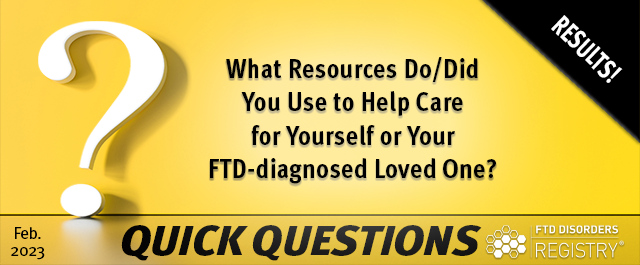
The majority of people who responded to our February 2023 Quick Question use online educational materials (569) to help care for themselves or their FTD-diagnosed loved one.
The majority of people who responded to our February 2023 Quick Question use online educational materials (569) to help care for themselves or their FTD-diagnosed loved one. This was followed closely by information from doctors (528). Family (366), articles (363), and printed educational materials (306) complete the top five resources used.
Each month the FTD Disorders Registry asks a question seeking feedback from persons affected by frontotemporal degeneration (FTD). Last month, 679 people responded to the question: What Resources do/did you use to help care for yourself or your FTD-diagnosed loved one?
Multiple responses were allowed in order for everyone to include all of the resources they use.
There were 86 persons diagnosed with FTD who responded to the question. Spouses (129), biological family members (132), caregivers (24), and friends (2) answered for themselves. They were also invited to complete the poll on behalf of their FTD-diagnosed loved one [spouses (195), biological family members (97), caregivers (8), and friends (3)]. Three people did not identify their relationship.
Most people (612) answering this month’s question were from 48 U.S. states (606) the District of Columbia (4), and two U.S. territories: Puerto Rico (1) and the Virgin Islands (1). There were 37 people from 8 Canadian provinces and territories who replied. Australia (9), the United Kingdom of Great Britain and Northern Ireland (6), and Mexico (5) complete the top five countries with the highest number of respondents.
CATEGORIES
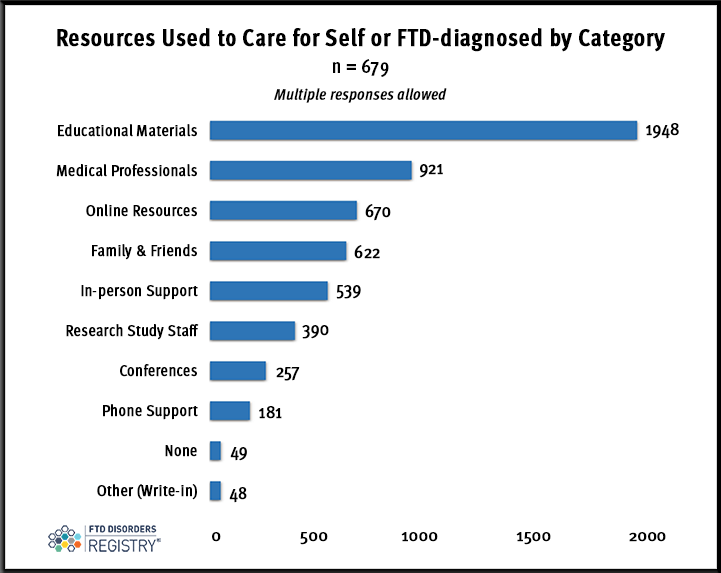
Choices were grouped by category. The total responses in each of these included:
-
1,948 Educational Materials
-
921 Medical Professionals
-
670 Online Resources
-
622 Family (366) & Friends (256)
-
539 In-person Support
-
390 Research Study Staff
-
257 Conferences
-
181 Phone Support
-
49 No Resources Available/Used
-
48 Other (Write-in)
EDUCATIONAL MATERIALS (TOTAL ANSWERS = 1,948)
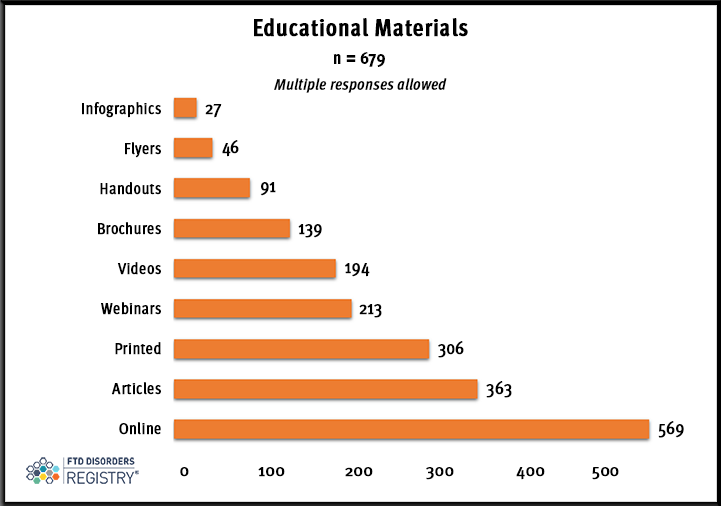
People were offered the choice of using educational materials online and printed. In addition, they could select from several types of materials. Two people wrote in podcasts as a resource. One person wrote that their main help was resources they found on CurePSP’s website (www.psp.org).
MEDICAL PROFESSIONALS (TOTAL ANSWERS = 921)
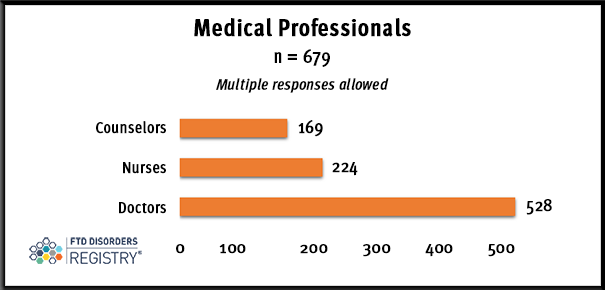
While doctors (528) surpassed nurses (224) and counselors (169) as resources for help, there were 5 write-in responses for other medical professions. Specifically listed were home healthcare nurses, palliative care nurses, live-in nurses, and family members who are in the medical profession.
ONLINE SUPPORT (TOTAL ANSWERS = 670)
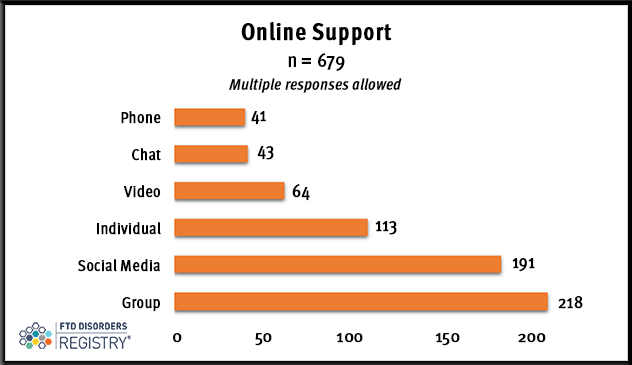
Many people are or have received help through an online support group (218). This includes before, during, and after the COVID-19 pandemic. Two people specifically named Facebook groups in their write-in answers.
IN-PERSON SUPPORT (TOTAL ANSWERS = 539)
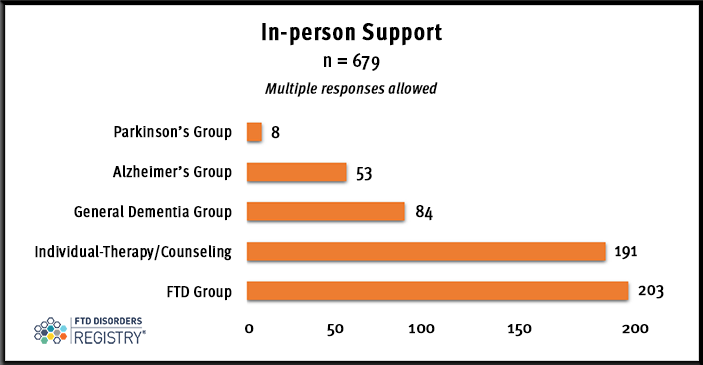
Many people attend in-person FTD support groups to help care for themselves or their FTD-diagnosed loved one. Others use individual therapy or counseling. One person wrote in that their main help was an AFTD in-person support group (the Association for Frontotemporal Degeneration www.theaftd.org).
RESEARCH STUDY STAFF (TOTAL ANSWERS = 390)
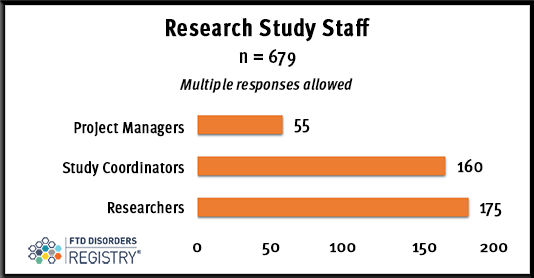
CONFERENCES (TOTAL ANSWERS = 257)
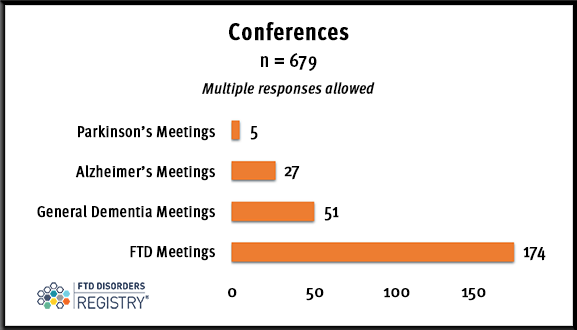
PHONE SUPPORT (TOTAL ANSWERS = 181)
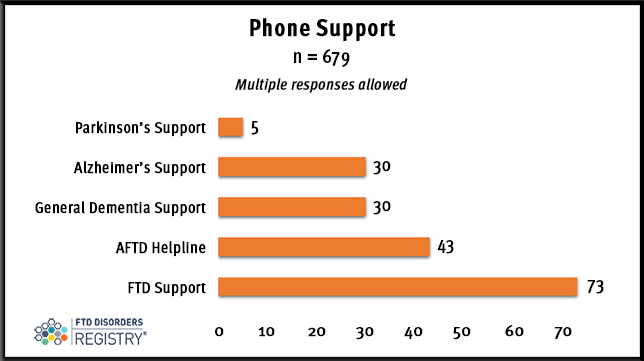
WRITE-INS (TOTAL ANSWERS = 48)
There were other resources people found to help them and their loved ones on the FTD journey that they wrote in. These fell under the following topics:
-
Caregiver
-
Hospice
-
Loved one passed away before any support systems existed/were near them
-
Social worker
-
Adult day care center/FILO Project
-
Faith-based support (including the Bible and chaplains)
-
Specific social media resources
-
Families/Groups focused on same diagnosis
-
Meetup groups
-
Common sense
-
Rare dementia support in Canada and the UK
-
Veterans Administration
Additional write-in answers are mentioned in the category summaries below where they fit.
RELATIONSHIP TO FTD-DIAGNOSED LOVED ONE
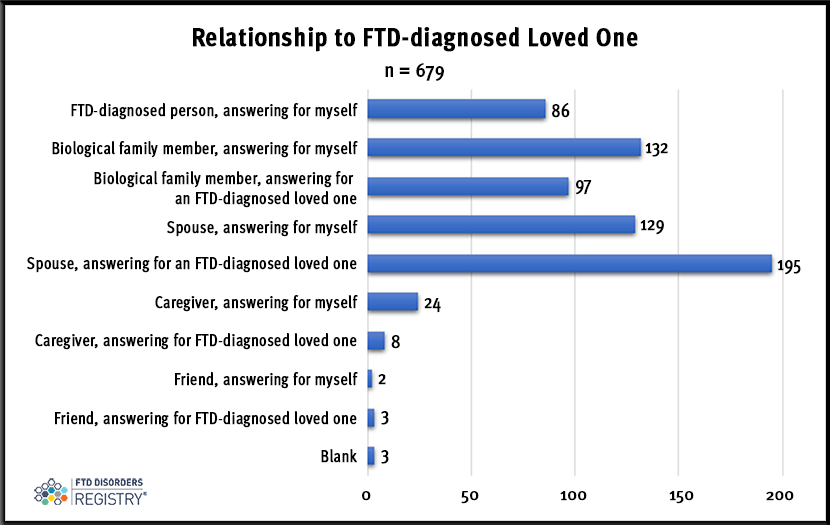
There were 86 persons diagnosed with FTD who responded to the question. Spouses, biological family members, caregivers, and friends could answer for themselves and then complete the poll again on behalf of their FTD-diagnosed loved one.
GENDER
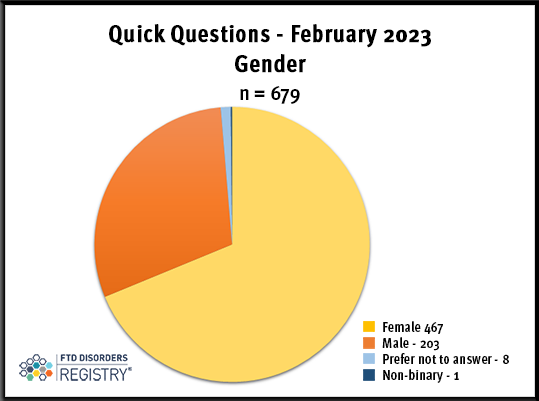
-
467 Female (69%)
-
203 Male (30%)
-
8 Prefer not to answer (0.75%)
-
1 Non-binary (0.25%)
You can access previous questions and responses on the Quick Questions summary page.
Together we can find a cure for ftd
The FTD Disorders Registry is a powerful tool in the movement to create therapies and find a cure. Together we can help change the course of the disease and put an end to FTD.
Your privacy is important! We promise to protect it. We will not share your contact information.



